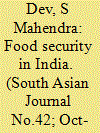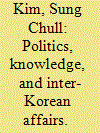| Srl | Item |
| 1 |
ID:
126913


|
|
|
| 2 |
ID:
130623


|
|
|
|
|
| Publication |
2014.
|
| Summary/Abstract |
There were four critical undercurrents for the growth of Korean think tank in the 1990s: democratization. the end o/the Cold War. _globalization coupled with local autonomy, and the expanded government budget accompanying Korea's rapid economic growth. In contrast to American think tanks which are private but normally server as public policy advocates, most of the important Korean think tanks are supported by the government and they are not independent public policy advocates. the Korean think tanks are highly susceptible to domestic political dynamics for instance, the presidential office's power over the over the appointment of directors.
|
|
|
|
|
|
|
|
|
|
|
|
|
|
|
|
| 3 |
ID:
121957


|
|
|
|
|
| Publication |
2013.
|
| Summary/Abstract |
In the wide domain of finance, taxation is one of the issues to which public opinion is most sensitive. This paper explores why tax reform was hotly debated in Japan throughout the 1920s, focusing on the policies of the two main political parties. Though a topic rarely treated by historians, this controversy reveals a wealth of information on the concerns that lay behind policy choices in years that were marked by economic instability and social unrest; it shows, in particular, how the ruling elites tried to attenuate class conflict by enhancing the redistributive function of taxes, which had thus far been subordinated to the encouragement of rapid economic growth and the financing of state investment. While these attempts deserve attention as tentative steps towards the development of a welfare state, their limits indicate that the parties, in spite of extending the suffrage during this period, retained strong links with a restricted network of established constituents. This paper dwells especially on the earliest and least studied phase of the dispute on tax reform, in order to prove that the emergence of distinct party platforms did not stem simply from tactical considerations, but was rooted in broader policy visions.
|
|
|
|
|
|
|
|
|
|
|
|
|
|
|
|
| 4 |
ID:
124950


|
|
|